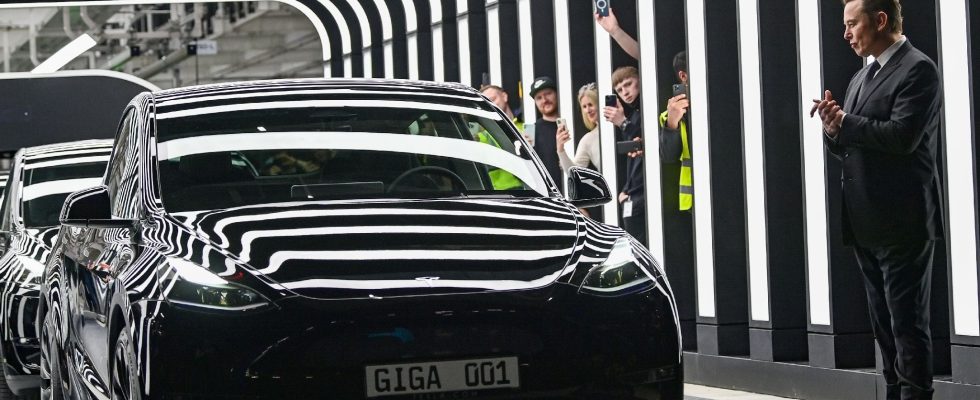When setting out to conquer Europe, the cowboy Tesla certainly did not anticipate such a cultural shock. For more than four months, mechanics at its repair shops in Sweden have been waging what has become “the longest strike in the country’s recent history”, in the words of Jesper Pettersson, a spokesperson for the powerful national union IF Metall – 300,000 members to its credit. At the origin of this unprecedented conflict, the refusal of the electric car producer to sign the collective agreement which establishes the basis of their working conditions, under the pretext that it does not do so in any other country. A rash decision: more than 90% of Swedish employees are covered by such agreements. “Whether it’s salaries, working hours or pensions, everything is set by collective agreements in Sweden. They are at the heart of our model,” insists Jesper Pettersson.
Enough to explain the vast revolt which has opened against the company of billionaire Elon Musk in the Scandinavian country. In solidarity with the 130 mechanics on strike and to protect one of the pillars of their social model, the unions are increasing operations against the American group: stopping the unloading of its vehicles in ports, deliveries of license plates registration by local post office and maintenance of its electric charging stations, suspension of garbage collection in front of its points of sale… Former social democratic Prime Minister Stefan Löfven – who chaired IF Metall for a long time – has since called his Facebook account encourages Swedish customers not to buy Tesla, welcoming the fact that Stockholm taxis have stopped acquiring vehicles from the manufacturer to expand their fleet.
“Actions of sympathy” in other countries
Bad luck for the automobile company, the Swedish conflict quickly spread. And the Danish, Norwegian and Finnish dockers announced in turn in December their intention to block deliveries of the brand’s vehicles, as part of “sympathetic actions” towards their Nordic neighbors. A few days later, a consortium of institutional investors – including the large Norwegian pension fund KLP, with nearly 70 billion euros in assets under management – urged Tesla to “reconsider its current approach towards unions”, expressing his attachment “to the right to demand a collective agreement” in a letter consulted by the Reuters agency.
Could opposition to Tesla continue to swell? Within IF Metall, Jesper Pettersson says he receives “great support from their sister organization”, the German union IG Metall. Last October, he claimed to have recorded a clear increase in membership at the Tesla factory in Grünheide, southeast of Berlin, amid concerns about safety at work. A month later, the site’s tens of thousands of employees won a 4% salary increase and the guarantee that a new vehicle would be produced on site, following a visit from Elon Musk. Enough to slow down the emergence of a large-scale social movement? “There is a risk of contagion from Northern Europe to Germany, especially since the Berlin factory has experienced some moments of tension,” considers Arnaud Aymé, transport specialist for the firm SIA Partners.
The extension project in Germany rejected
However, Tesla already has a lot to do across the Rhine. Its expansion project to Grünheide was rejected by the local population in a consultative vote. A setback which the Italian Minister of Economic Development, Adolfo Urso, reveled in at the end of February. Indifferent to the social discontent in Northern Europe, Italy is one of the many countries fighting to house the second factory that Tesla could build on the Old Continent. And the rejection of the expansion project in Germany “will lead to a decision by the group”, promised Adolfo Urso, while congratulating himself on having received “very positive” responses from the company.
Engaged in a fierce price war, Tesla needs more than ever a production device capable of meeting demand, as competition is increasing. In the fourth quarter of 2023, the Chinese BYD overtook the American troublemaker as the world’s leading seller of electric cars, a sign of a changing era in the automobile industry. The historic manufacturers, Stellantis and Renault in the lead, are also sharpening their offers to take the lead in the electric race. In this context, “the company could end up having a problem if social movements prevent it from supplying the European market. But we are not there yet”, moderates Arnaud Aymé, who brushes aside the idea of a effect of strikes on Tesla’s image.
The figures tend to validate this observation. In December 2023, the group’s sales jumped by 9% on the Swedish market. Over the entire year, the Model Y SUV was the best-selling private vehicle in Europe, all engines combined, assures the newspaper Automotive News. But other experts are more cautious, such as German analyst Matthias Schmidt: “These events undoubtedly constitute a huge cultural shock for Tesla, which has a habit of trampling on regulations. This could potentially hamper its pace of progress and have an impact on its brand image.” Especially since the standoff does not seem to be ending any time soon. Unsurprisingly, Elon Musk made a post on the social network X to describe the non-issuance of license plates in Sweden as “insane”. According to IF Metall, negotiations remain at a standstill. No matter: the Swedish union says it is ready to continue the strike “as long as necessary”.
.
